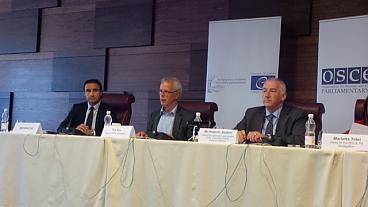Bosnian mistrust of democratic institutions a threat to stability
Bosnian mistrust of democratic institutions a threat to stability
'Last Sunday Bosnia elected three presidents and the country’s parliament, two regional parliaments and a new president of Republika Serbska, which together with the Bosnian-Croatian Federation forms the State of Bosnia,’ says Senator Kox. ‘These elections in no sense led to any enthusiasm amongst the population. Half of them stayed at home, while the other half voted without any belief in change occurring as a result. Faith in democratic institutions has largely disappeared. That’s dangerous.’

The election observers, with Tiny Kox in the centre.
By Tiny Kox
The parliamentary assemblies of the Council of Europe and the Organisation for Security and Cooperation in Europe sent observers to the elections. ‘These went reasonably well, but with the usual favouring of the major parties and hanky-panky with the staff at the polling stations’, says Kox. ‘Major scandals we didn’t see. But the real scandal is that elections in Bosnia lead to nothing at all.' That’s got everything to do, according to the SP Senator, with the fact that the country has, since the Bosnian civil war and the foreign interventions, become a powerless international protectorate. ‘As a result,’ argues Kox, ‘decisive government is impossible and politicians use politics primarily for personal gain. Around election time the country almost collapses under billboards displaying false promises from politicians in whom no-one has the slightest trust. That people nevertheless vote is largely a result of the fear that not doing so could threaten your job, your house, your future. The polling booths are full of party people who keep a precise record of who hasn’t yet voted. People who still haven’t voted are put under pressure via telephone and text messages.’
'In order to prevent politicians falling back on the fact once again that they have been democratically elected, I have, with the agreement of both observers’ missions, emphasised during a well-attended press conference the need for the people’s confidence to be restored,’ says Kox. ‘If not, then stability will be in danger, dangerous indeed in the midst of the heart of Europe –including for the politicians who think they have a free hand and need do nothing to attract people’s support. Earlier in the year there were scatterings of unrest. During the elections there was no movement which could make that protest visible, but anger continues. This is understandable in a country where more than a quarter are out of work, youth unemployment is twice as high as that and jobs are blatantly filled by politicians. Because of this, investment stays away and Bosnia is becoming ever more a failed State with no prospects.’
In the Council of Europe’s view a new Constitution is needed and the organisation of the whole country along ethnic lines must end. ‘The European Court of Human Rights, a Council of Europe body, has issued a binding ruling on this, but the Bosnian politicians are doing nothing about it,’ says Kox. ‘That’s in conflict with fundamental human rights. I will be emphasising this in my final report to the Council of Europe and urging them to introduce measures. Bosnia has already, as a member state, obligations to which it should be adhering – for its own good.’
